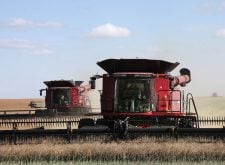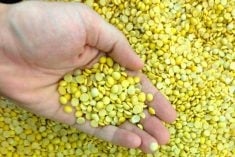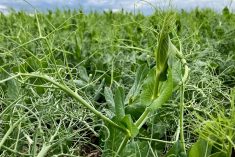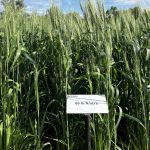CNS Canada — Western Canadian farmers may be set to plant fewer lentil and pea acres this spring, but chickpeas are looking to be one pulse crop that stands out.
“Acres are definitely going to increase significantly,” said Colin Young of Midwest Grain at Moose Jaw. He expected to see a doubling in area from the 135,000- to 165,000-acre chickpea crops planted in recent years.
Seed supplies won’t be an issue to reach that 300,000-acre mark, as the hot and dry growing season in 2017 resulted in exceptional seed with high germination and no trace of disease.
Read Also

U.S. grains: CBOT soybeans, corn, wheat fall in USDA data aftermath
Chicago grains took a dive on Friday, following a closely watched U.S. government crop report and the release of export data that could provide clues into Chinese buying.
“Given the availability of seed and given the bleak outlook for other pulse crops, chickpeas look to be a good alternative,” said Young.
While peas and lentil prices declined over the past few months following India’s introduction of tariffs, the chickpea market has stayed relatively strong.
The crop also fares better in the drier conditions that are persisting in the major chickpea growing regions of Saskatchewan, Young said.
While their area may double, chickpeas are still a small crop in the bigger picture. Young didn’t expect to see too many new growers; rather, producers who have grown the crop in the past are reintroducing them to rotations.
Production contracts were going for over 40 cents/lb. earlier in the winter, but are now in the mid- to high 30s, said Young.
Russia, the U.S., Argentina, Turkey, India and other growing regions have all responded to the relatively favourable prices with increased acres.
With chickpeas “an island of stability in the pulse world,” Young expected increased seeded area worldwide will eventually weigh on prices.
“Chickpeas are volatile and difficult to grow everywhere,” he said, noting crop failures are always possible wherever the crop is grown.
Smaller-calibre peas have the most competition, and lower prices, with a premium on sizes nine millimetres and up.
Traditional buyers for Canadian chickpeas include the Indian sub-continent, North Africa and the Middle East. There’s also a growing North American demand for chickpeas as a food ingredient.
The U.S. pet food industry has also created a market for lower-quality smaller seeds in recent years.
“We went from feeding hog barns at five to six cents a pound, to pet food products, at a grower level, at 17 to 30 cents/lb.,” said Young, noting the downside for chickpeas is being mitigated by the U.S. pet food market.
— Phil Franz-Warkentin writes for Commodity News Service Canada, a Glacier FarmMedia company specializing in grain and commodity market reporting.















